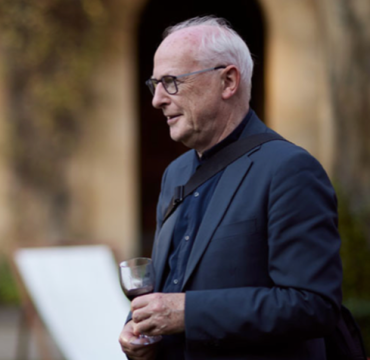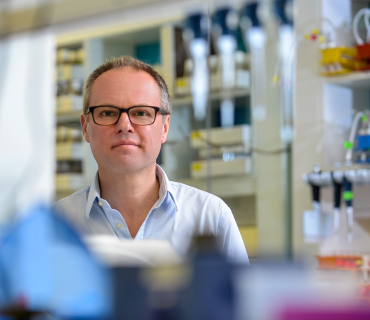
Four Oxford researchers elected to the US National Academy of Sciences
Last week, the National Academy of Sciences in the US announced the election of 120 members and 30 international members in recognition of their distinguished and continuing achievements in original research. Election to membership in the NAS is a mark of excellence in science and considered one of the highest honours that a scientist can receive.
Four academics from the University of Oxford were elected this year as international members.
Véronique Gouverneur, Waynflete Professor of Chemistry, Department of Chemistry.
 Professor Véronique Gouverneur. Credit: Stephen Cannon.
Professor Véronique Gouverneur. Credit: Stephen Cannon. Her research has led to innovative fluorination processes to produce medicines and radiotracers for Positron Emission Tomography imaging. More recently, she launched a programme on safe and circular fluorine chemistry. Her laboratory invented the first methods to convert the mineral fluorspar into valuable fluorochemicals without the necessity to manufacture highly dangerous hydrogen fluoride. This advance attracted global attention and led her to found the spinout company FluoRok from the University of Oxford. She has previously received numerous international prizes and awards, was elected a Fellow of the Royal Society in 2019, and became an International Honorary Member of the American Academy of Arts and Sciences (US) in 2022.
She said: ‘I am thrilled to receive this recognition, and grateful to all members of my team who serve society through science. Becoming a member of the National Academy of Sciences is a privilege, and a superb opportunity to connect with a remarkable community.’
Desmond King, Andrew Mellon Professor of American Government, Department of Politics and International Relations.
 Professor Desmond King.
Professor Desmond King.He said: ‘I am immensely grateful to the NAS for this great honour, which also attests to the wonderfully supportive environment of Oxford University especially colleagues in the department of politics and Nuffield College. Membership of NAS is a further opportunity to engage in high level social science research with colleagues in the US and elsewhere.’
Andrew McMichael, Emeritus Professor of Molecular Medicine, Centre for Immuno-Oncology, Nuffield Department of Medicine.
 Professor Andrew McMichael.
Professor Andrew McMichael.Professor McMichael’s research has focused on T lymphocytes and innate immunity. Early in his career, he discovered the CD1 protein (which plays a role in immune surveillance) in a collaboration with Cesar Milstein. In the mid 1980s, Alain Townsend in his group made the crucial discovery that T lymphocytes react to short fragments of virus proteins that are bound to host proteins called HLA molecules. This finding transformed cellular immunology and is the basis of many developing cancer therapies and vaccines.
Professor McMichael and his colleagues also made important discoveries on the immune response to HIV, demonstrating that the virus could escape from immune control by the T lymphocytes by mutating these small peptides. This led to novel approaches to vaccine design that are ongoing. His team also discovered how the unusual HLA molecule, HLA-E, not only controls innate immunity but can also bind foreign peptides and stimulate T lymphocytes. Because this HLA molecule, unlike others, is not genetically variable it offers exciting possibilities for immunotherapy.
He said: ‘I am deeply honoured by this award which recognises the work of all my team over many years. I have always greatly admired American science, which is world leading, both collaborative and competitive, and globally relevant. I look forward to continuing close interactions in the years ahead.’
Gero Miesenböck, Waynflete Professor of Physiology, Department of Physiology, Anatomy & Genetics
 Professor Gero Miesenböck. Credit: Centre for Neural Circuits and Behaviour.
Professor Gero Miesenböck. Credit: Centre for Neural Circuits and Behaviour.
More recently, he has used optogenetics to gain insights into the neuronal regulation and biological function of sleep. He and his team at the Centre for Neural Circuits and Behaviour discovered that sleep-inducing neurons couple their electrical discharge to the use of oxygen in mitochondria, the energy-generating organelles that power all complex life. This work enabled a molecular interpretation of sleep pressure and identified aerobic respiration as a fundamental cause of sleep. Professor Miesenböck has received numerous international awards for his invention of optogenetics, including most recently the Shaw Prize, the Louisa Gross Horwitz Prize, and the Japan Prize, and is a Fellow of the Royal Society.
He said: ‘Beyond the immediate joy of being invited into the company of distinguished colleagues, it is nice to form a thread in the international fabric of science, especially with everything that’s going on right now.’
The full list of researchers elected to the National Academy of Sciences this year can be found on the NAS website.
 Statins do not cause the majority of side effects listed in package leaflets
Statins do not cause the majority of side effects listed in package leaflets
 Professor Sibel Erduran joins prestigious Academy of Social Sciences Fellowship
Professor Sibel Erduran joins prestigious Academy of Social Sciences Fellowship
 Professor James Binney awarded Royal Astronomical Society’s Gold Medal
Professor James Binney awarded Royal Astronomical Society’s Gold Medal
 New Year Honours 2025
New Year Honours 2025